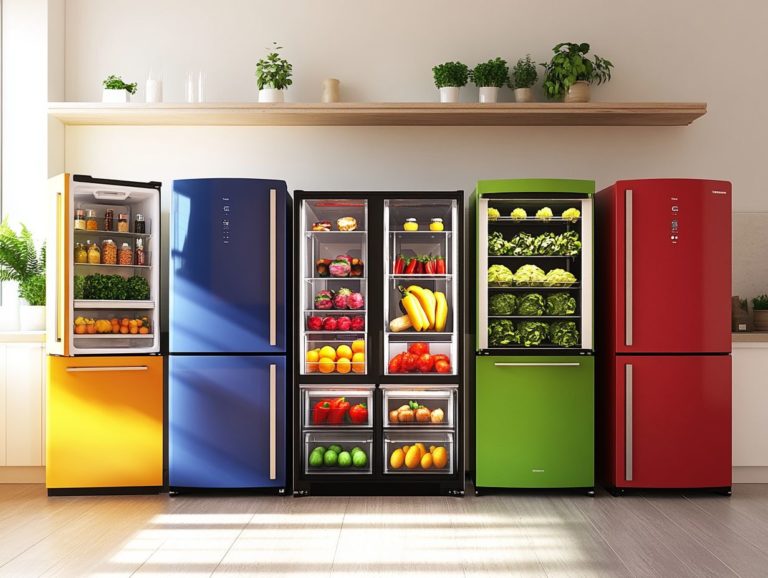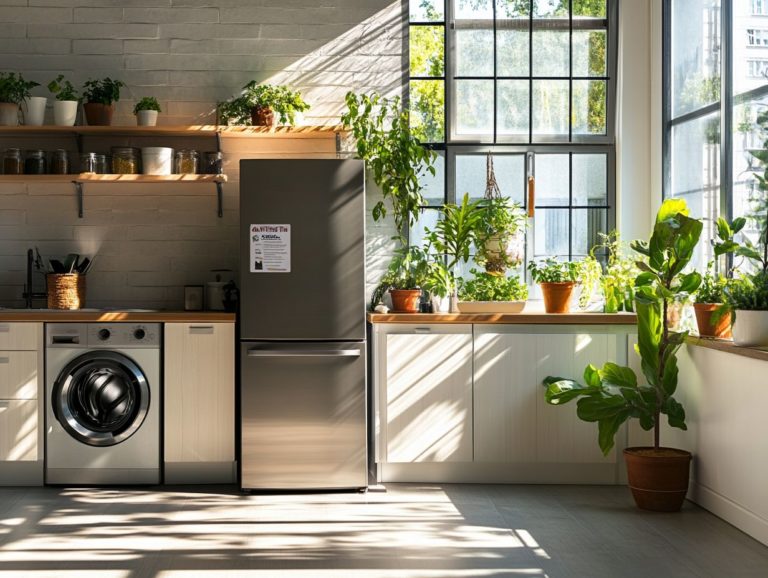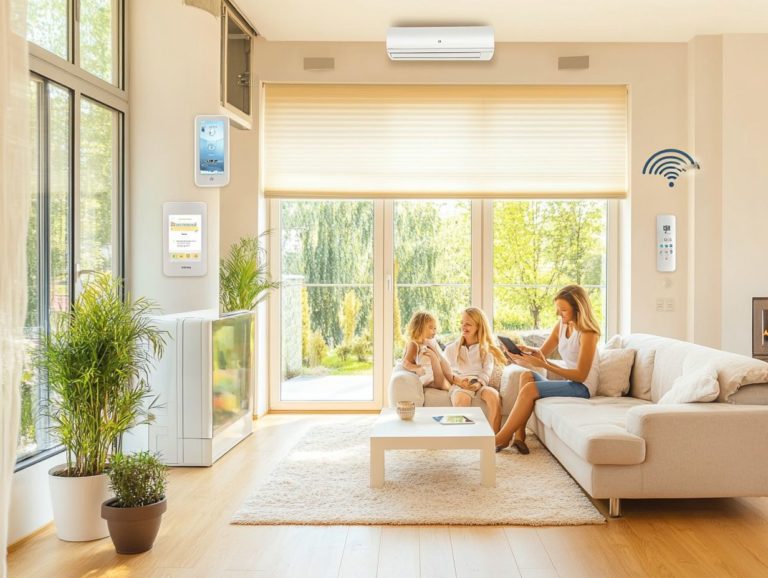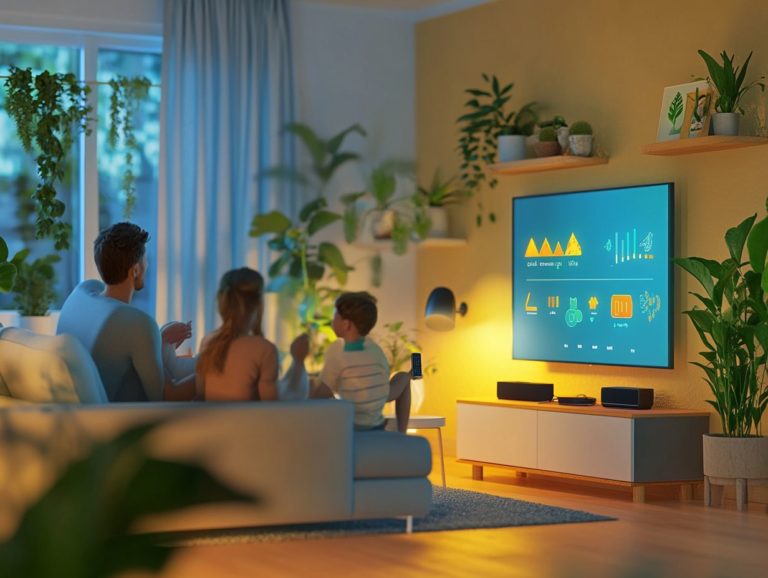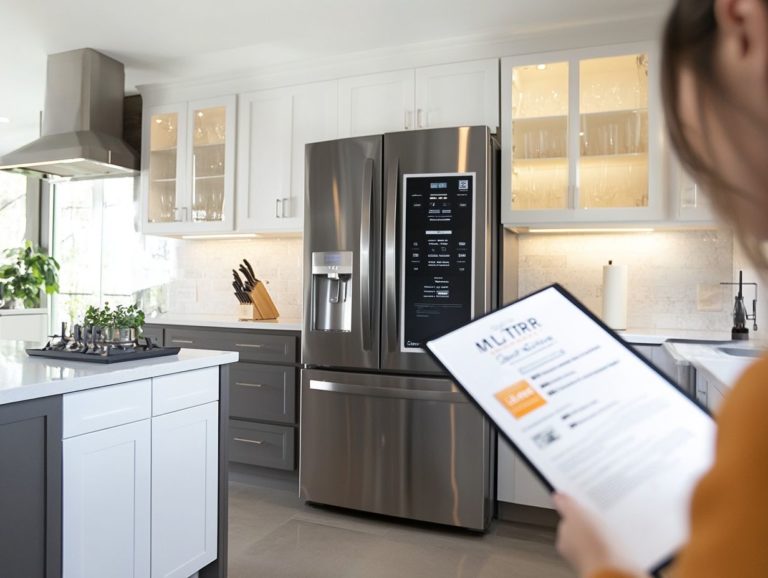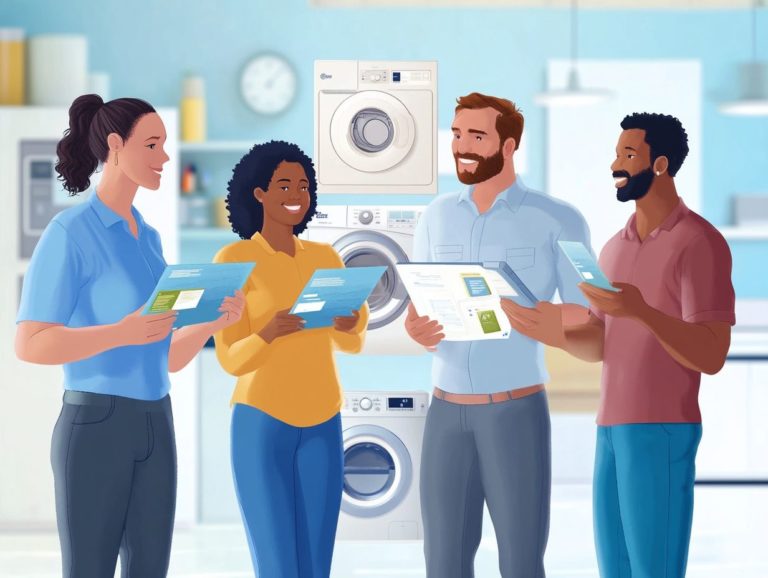The Positive Impact of Energy-Efficient Appliances
In today s world, prioritizing energy efficiency is paramount. Energy-efficient appliances not only help you reduce your carbon footprint but also provide substantial savings on your utility bills.
Selecting the right appliances may feel overwhelming, but it doesn’t have to be. This article explores the benefits of energy-efficient appliances and guides you on how to choose the best options available.
It also offers practical steps to facilitate the switch, ensuring you achieve the perfect balance between savings and sustainability in your home.
Contents
- Key Takeaways:
- The Benefits of Energy-Efficient Appliances
- How to Choose Energy-Efficient Appliances
- Making the Switch to Energy-Efficient Appliances
- Maximizing the Impact of Energy-Efficient Appliances
- Frequently Asked Questions
- What are energy-efficient appliances?
- What is the positive impact of using energy-efficient appliances?
- How do energy-efficient appliances work?
- What are some examples of energy-efficient appliances?
- Are energy-efficient appliances more expensive?
- What can I do to increase the positive impact of energy-efficient appliances?
Key Takeaways:

- Energy-efficient appliances help reduce environmental impact by conserving natural resources and reducing greenhouse gas emissions.
- Choosing energy-efficient appliances can lead to significant cost savings on utility bills in the long run.
- Make the switch today and save money while helping the planet!
Defining Energy Efficiency
Energy efficiency is all about using less energy to achieve the same tasks. This approach aims to lower energy consumption while boosting productivity.
This concept is crucial for sustainable development, highlighting the importance of using energy-efficient appliances and innovative technologies that cut down on energy waste.
By investing in energy-saving upgrades, you can significantly lower your utility bills and contribute to a cleaner energy future.
Moreover, you’ll shrink your carbon footprint all while promoting an energy-conscious lifestyle.
These advancements help save energy, as they not only save valuable resources but also help mitigate the adverse effects of greenhouse gas emissions.
For example, when you incorporate LED lighting or ENERGY STAR-rated refrigerators, you’ll notice remarkable reductions in electricity usage.
These devices are engineered to perform at their best while consuming less energy. This results in substantial savings each year.
By replacing outdated appliances with those designed for efficiency, you enhance your financial well-being by cutting energy costs and align yourself with broader environmental goals.
This fosters a community focused on sustainable living, where every small change contributes to a larger impact.
The Benefits of Energy-Efficient Appliances
Energy-efficient appliances, certified by esteemed programs like ENERGY STAR, provide a wealth of advantages that elevate both your economic and environmental well-being.
By embracing smart technology and energy-saving devices, you cut down on energy consumption while playing a crucial role in sustainable practices.
This mindful choice helps combat climate change and reduces greenhouse gas emissions, making a positive impact on the planet.
Environmental Impact
The environmental impact of using energy-efficient appliances is nothing short of transformative.
By choosing these products, you play a crucial role in significantly reducing greenhouse gas emissions and lowering the carbon footprint of your household.
Embracing energy conservation practices and opting for renewable energy sources gives you the power to contribute to sustainable development and combat climate change.
These appliances are often equipped with advanced technologies, such as smart sensors and variable speed motors, which minimize energy waste while enhancing performance.
For instance, ENERGY STAR-rated products can slash energy usage by up to 50%, translating into substantial long-term savings on your electricity bills.
Did you know that a study by the U.S. Department of Energy revealed that if every American home replaced just one light bulb with an ENERGY STAR bulb, it would be like removing one million cars from the road?
By adopting these solutions, you promote environmental wellness and inspire your community to transition towards a more sustainable future, ultimately benefiting both the planet and its inhabitants.
Cost Savings
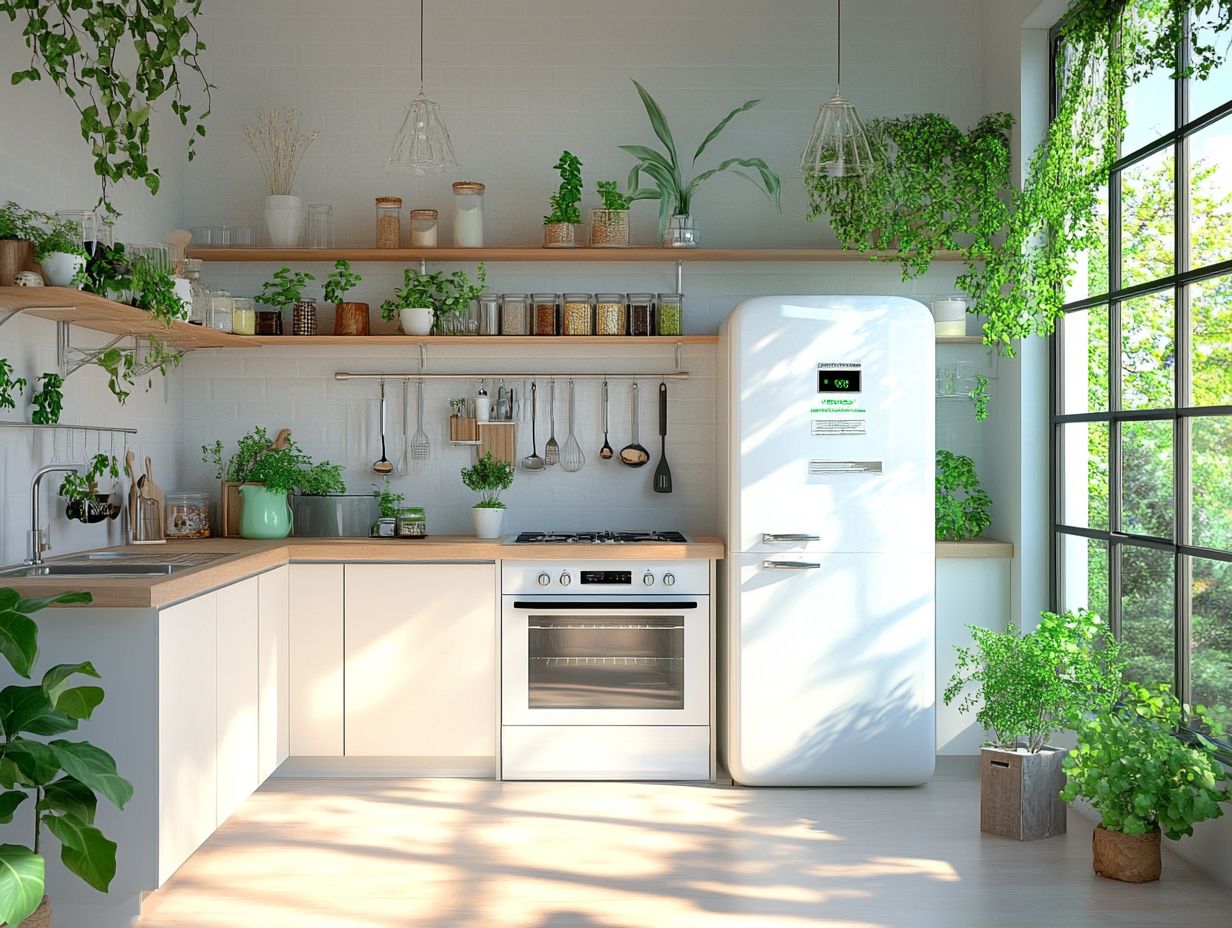
Investing in energy-efficient appliances is a smart move. You can save significantly on your energy bills.
These devices use less energy while delivering excellent performance.
By embracing energy-saving technology, you can lower your utility bills and overall energy costs. This enhances your economic stability.
For example, Energy Star certified refrigerators can save you around $200 over their lifetime. High-efficiency washers can cut your annual water and electricity costs by more than $100.
These savings add up significantly over time, making the initial investment in energy-efficient appliances worthwhile.
Many utility companies offer financial incentives and rebates. This encourages homeowners like you to make the switch.
These rebates can help offset the upfront costs. You can enjoy immediate savings while securing a robust return on your investment.
Choosing energy-efficient appliances is not just an eco-friendly decision; it s also a financially savvy one.
How to Choose Energy-Efficient Appliances
Choosing energy-efficient appliances means evaluating key factors. Look for energy ratings and certifications like Energy Star.
Understanding the energy consumption of different appliances helps you make informed decisions. You can choose modern options that align with your energy needs.
Understanding Energy Labels
Energy labels show how efficient appliances are. These labels help you choose products that meet your sustainability goals.
With a clear rating system, these labels classify appliances from the most efficient to those that use more energy. This includes everything from fridges to washing machines and air conditioners.
If you see an appliance rated A+++, it means it conserves energy exceptionally well. A D rating suggests it may be time to consider an upgrade.
By comparing these ratings, you can make informed choices. This helps you save on utility bills and supports a greener planet.
Factors to Consider
When selecting energy-efficient appliances, consider energy use and initial costs. Smart technology can enhance efficiency and simplify management.
Weigh the upfront investment against expected reductions in energy costs over time. More efficient models often lead to lower operational costs.
Smart technology is particularly valuable. It allows you to monitor and adjust your energy usage for maximum savings.
Making informed choices about your appliances can lead to a significant impact. Ensure each selection aligns with your budget and energy conservation goals.
Making the Switch to Energy-Efficient Appliances

Switching to energy-efficient appliances is a key step in saving energy. It’s not just about replacing old appliances; it’s about aligning with your sustainability goals.
Steps to Take
To successfully transition to energy-efficient appliances, follow these practical steps for a seamless shift and optimal energy management. Start by evaluating your current appliances and researching energy-saving technologies. Understand the incentives available to you.
Begin by assessing the efficiency of your appliances. This helps you spot outdated units that could be costing you money! Utilize online resources and check energy ratings to empower yourself with knowledge about the latest market options.
Compare features to find long-term savings. Don t overlook local utility programs; they may offer valuable rebates or financing options to ease your transition.
Finally, evaluate your household energy needs to tailor your selection to fit your lifestyle while maximizing savings. This ultimately leads to a more sustainable and efficient home.
Maximizing the Impact of Energy-Efficient Appliances
Maximizing the benefits of energy-efficient appliances involves more than just choosing the right ones. Use simple strategies to save energy and further minimize costs.
By prioritizing energy-saving upgrades and incorporating smart technology, you can significantly enhance your household’s overall efficiency.
Additional Tips for Energy Savings
In addition to selecting energy-efficient appliances, embrace various strategies to boost your energy savings and promote sustainable practices at home. Even simple adjustments in your usage and maintenance routines can lead to remarkable reductions in energy consumption.
For instance, adopt mindful habits like turning off lights when they re not needed and unplugging devices. These actions can make a noticeable difference in your energy bills.
Regular maintenance of your appliances is vital. Ensure they operate at peak efficiency by taking time to clean filters and check for leaks. Smart meters provide real-time insights into your energy use, helping you save more.
By combining these practices, you not only facilitate energy savings but also deepen your commitment to sustainability, creating a lifestyle that benefits both the environment and your wallet.
Frequently Asked Questions
What are energy-efficient appliances?
Energy-efficient appliances save you money by using less energy to do the same job.
What is the positive impact of using energy-efficient appliances?
Using energy-efficient appliances reduces energy consumption, lowers electricity bills, and helps decrease greenhouse gas emissions, contributing to climate change mitigation.
How do energy-efficient appliances work?
These appliances use advanced technology and design features like improved insulation, better temperature control, and energy-saving settings to reduce energy use while effectively performing their intended functions.
What are some examples of energy-efficient appliances?
Examples include refrigerators, washing machines, dishwashers, air conditioners, and energy-saving light bulbs that are Energy Star certified.
Are energy-efficient appliances more expensive?
While they may have a higher upfront cost, energy-efficient appliances save money in the long run due to lower energy bills. Many governments also offer rebates and tax credits to incentivize their purchase.
What can I do to increase the positive impact of energy-efficient appliances?
To maximize their impact, maintain them properly by cleaning filters and coils regularly, using energy-saving settings, and disposing of them properly at the end of their lifespan. Additionally, you may want to explore understanding different types of energy-efficient appliances and consider investing in renewable energy sources to power your energy-efficient appliances for an even greater positive impact.


